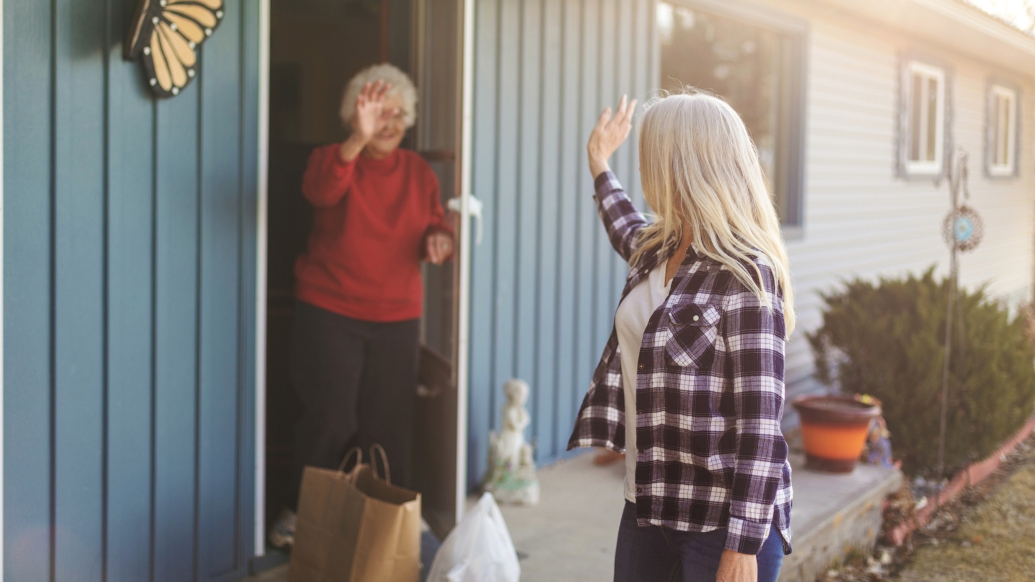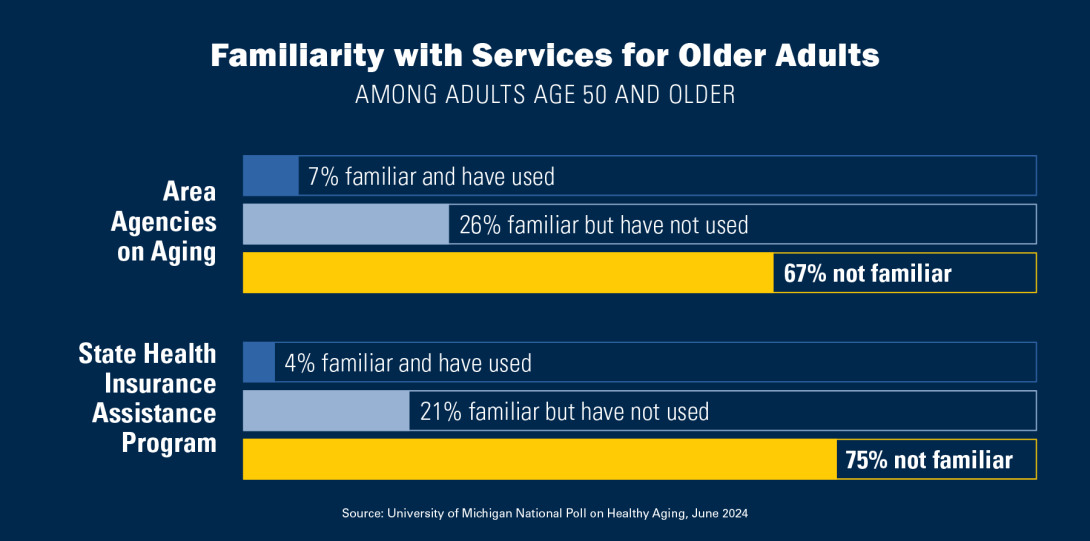Poll shows need to build awareness of Area Agencies on Aging, State Health Insurance Assistance Programs and options for longterm services and supports
2:39 PM
Author |

Older Americans may be missing out on a wide range of programs and services that could help them meet their needs or assist their aging loved ones, a poll suggests.
The findings from the National Poll on Healthy Aging, based at the University of Michigan, show most older adults don’t know about important public resources for older adults and their caregivers, either by name or general description.
The poll asked more than 4,000 adults over age 50 about their awareness and use of Area Agencies on Aging, State Health Insurance Assistance Programs for navigating Medicare, and their options for Long Term Services and Supports), should they need them.
And only a small minority – less than 10% – say they used these programs or knew a lot about them.
Since many of these programs go by different names at the local, regional or state level, the poll questions also included a general description.
Only 7% of respondents say they had used their AAA’s services, 4% say they had used a State Health Insurance Assistance Program service, also known as SHIP, and 3% say they knew a lot about LTSS options.
One in four adults in the United states, age 50 and older (26%), were familiar with AAAs but had never used them, and 21% were familiar with these state assistance programs, but had never used them.
But 67% of U.S. residents over age 50 weren’t familiar with AAAs, 75% weren’t aware of SHIPs, and 88% say they didn’t know anything, or knew very little, about their options for receiving LTSS if they needed them.
Poll respondents who were age 65 or older were more likely to be familiar with AAAs and SHIPs than those age 50 to 64, whether or not they had used the service.
In all, 37% of those over 65 were familiar with AAAs, versus 29% of those age 50 to 65; for State Health Insurance Assistance Programs , 31% of the older group say they were familiar, compared with 20% of the younger group.
But even among those over age 65 who were aware of these services, most had not used them.
In all, only 9% of people over 65 had used their AAA’s services and only 5% had used SHIP services.
Michigan-specific findings
An analysis of Michigan-specific data from the poll shows that older Michiganders were more likely than their peers in the rest of the country to say they had heard of AAAs.
The same was true for the State Health Insurance Assistance Programs , which the poll asked about by its name in the state, the Michigan Medicare Assistance Program.
SEE ALSO: Even Before COVID-19, Many Adults Lacked Stable Food Supply
Still, 55% of older Michiganders didn’t know about AAAs and 68% didn’t know about State Health Insurance Assistance Programs or MMAP for Medicare assistance.
The percentage who had actually used either service was similar in Michigan and nationwide.
Need for more awareness
Overall, the poll’s findings suggest a need for more efforts to build awareness about how older adults and their caregivers can find and access the services available to them.
Many such programs are supported by state and federal tax dollars.
“Our poll points to a gap between the resources that exist and what older adults know is available to help them navigate their choices as they age or care for others,” said Erica Solway, Ph.D., M.S.W., M.P.H., the deputy director of the poll, which is based at the U-M Institute for Healthcare Policy and Innovation.
“Even if people don’t know these programs by name, it appears that states and nonprofits could do more to spread general awareness of websites and hotlines that can act as gateways to the full array of services each person might qualify for,” she added.
“Often, members of the public seek these services for themselves or others in times of crisis. So, the message that support is available, and how to find it when it’s needed, could help people plan.”
The National Poll on Healthy Aging is supported by AARP and Michigan Medicine, U-M’s academic medical center.
The Michigan Poll on Healthy Aging, which gathers Michigan-specific data, is supported by the Michigan Health Endowment Fund.
Finding services for older adults
Solway points to the federal government’s Eldercare Locater site, eldercare.acl.gov, which prompts visitors to enter their ZIP code or to call 1-800-677-1116 to start the process of finding services for older adults and caregivers in their community.
Another gateway service for finding programs for older adults and people with disabilities is the Benefits Checkup website run by the National Council on Aging, a nonprofit organization, at benefitscheckup.org.

There’s also a federal Disability Information Access Line, also known as DIAL, which helps people with disabilities get connected to information about local community resources that support independent living by entering their ZIP code on the DIAL website or calling 1-888-677-1199.
There is also information available from state aging agencies and county or municipal governments, including local senior centers.
Navigating the array of services and programs available can be daunting, which makes awareness efforts about how to get help even more important, the poll team notes.
Some services have income-based, geographic or demographic eligibility limits to receive them.
Others are available to any older adult or caregiver for older adults, and many also serve younger people with disabilities.
More about SHIPs, AAAs and LTSS programs
The SHIP program is open to anyone who qualifies for Medicare because of age or disability, and offers help at the local level.
State Health Insurance Assistance Programs is independent of any private insurance company or brokers involved in Medicare Advantage plans.
SEE ALSO: Health costs top older adults’ list of concerns for people their age, poll finds
Each state has its own State Health Insurance Assistance Programs ; the national website, www.shiphelp.org, and phone number (1-877-839-2675), makes it easy to find them.
State Health Insurance Assistance Programs can be very helpful to anyone who wants to review their Medicare options ahead of or during the annual Open Enrollment period that runs from October 15 through December 7.
Such a review can help determine if switching plans within Medicare Advantage, or between Medicare Advantage and traditional Medicare, would save on out-of-pocket costs and premiums.
These services are vital. No matter how a service is funded or organized, it’s important to make sure people know about it before they or their loved ones need it, or can find information easily and have access to services when they are needed."
-Erica Solway, Ph.D., M.S.W., M.P.H.
People can also seek these services any time during the year, for instance when approaching Medicare enrollment age or anticipating retiring from a job that provides health insurance.
In addition to paid staff, volunteers play a major role in State Health Insurance Assistance Programs.
They receive special training from staff and then meet with Medicare-eligible adults one-on-one to explore their health insurance options at locations such as public libraries and local senior centers.
As for Area Agencies on Aging, Solway notes that there are more than 600 AAAs across the country, receiving federal and often state funding, but operating under different names and cover different geographical areas.
A number of similar organizations serving Native American tribal communities receive direct federal funding for services to older adults.
For example, Michigan has 16 AAAs.
In the greater Detroit-Ann Arbor area where the University of Michigan is located, three different AAAs serve older adults across seven counties. A directory of all Michigan AAAs is available through the statewide AAA association at 4ami.org/members.
AAAs often act as connectors that help older adults, caregivers, and adults with disabilities find local help such as food programs, transportation, adult day care, in-home care, legal help and household help. They may offer services to reduce isolation, classes for wellness and exercise, and assistance with finding housing options or making an older adult’s home safer to stay in.
For people who need daily help with self-care and other tasks because of a medical condition or disability, and who meet income and asset eligibility requirements, many states have long term services and support, or LTSS, programs that provide such care in the person’s home, their relative’s home, or another setting outside of long-term care facilities.
In Michigan, such programs include the MI Choice waiver program, the Program for All Inclusive Care for the Elderly (PACE), and other Medicaid home and community-based waiver programs.
SEE ALSO: 8 ways older adults can reduce loneliness and social isolation
Area Agencies on Aging, Centers for Independent Living, known as CIL, and other partners provide information and assistance and often can help screen individuals for eligibility and assist with enrollment in LTSS programs.
Centers for Independent t Living provide independent living services for people with disabilities and provide tools, resources and supports to promote equal opportunities, self-determination and respect.
How services are organized and funded, and how people find their way to the ones they’re eligible for, can be complicated.
A specific example
Solway points to an example, the Ann Arbor Meals on Wheels program based in U-M Health’s Department of Community Health Services.
Like home-delivered meal programs nationwide, Ann Arbor Meals on Wheels delivers meals and other supportive services to older adults and people with disabilities who live in its service area and cannot shop or cook for themselves.
There are seven organizations in the county where U-M is located that provide home-delivered meals, and individuals can find out which one serves their home address by visiting Washtenaw County’s Senior Nutrition Program website.
Ann Arbor Meals on Wheels receives part of its funding from federal, state and county governments, part from donations from individuals, businesses and foundations, and part from Michigan Medicine itself.
It relies on volunteers to deliver meals to individuals’ homes, and receives referrals for new clients from many sources, including U-M Health’s clinical social workers and the nonprofit Area Agency on Aging serving the region, called AgeWays.
“These services are vital. No matter how a service is funded or organized, it’s important to make sure people know about it before they or their loved ones need it, or can find information easily and have access to services when they are needed,” Solway said.
“Our poll shows the importance of that awareness and accessibility.”
Poll sample details
The poll was a nationally representative survey conducted by NORC at the University of Chicago for IHPI and administered online and via phone in February and March 2024 among 1,079 Michigan older adults and 3,012 non-Michigan adults aged 50 to 101.
The sample was subsequently weighted to reflect the U.S. and Michigan populations.
Read past National Poll on Healthy Aging reports and about the poll methodology.
Sign up for Health Lab newsletters today. Get medical tips from top experts and learn about new scientific discoveries every week by subscribing to Health Lab’s two newsletters, Health & Wellness and Research & Innovation.
Sign up for the Health Lab Podcast: Add us on Spotify, Apple Podcasts or wherever you get you listen to your favorite shows.

Explore a variety of health care news & stories by visiting the Health Lab home page for more articles.

Department of Communication at Michigan Medicine
Want top health & research news weekly? Sign up for Health Lab’s newsletters today!





